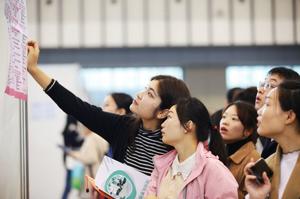 Candidates look at employment opportunities at a job fair in Nanjing, Jiangsu province. (LIU JIANHUA / CHINA DAILY)
Candidates look at employment opportunities at a job fair in Nanjing, Jiangsu province. (LIU JIANHUA / CHINA DAILY)
Economic recovery and employment stability have become the top priorities for the second half of this year, as the Chinese government looks to hedge risks arising from the weak external demand due to the novel coronavirus pandemic fallout, experts said.
"The government will give top priority to stabilizing employment and ensuring people's livelihoods," Finance Minister Liu Kun said in a statement published by the Ministry of Finance on Tuesday.
Liu stressed the need for stronger countercyclical measures and more proactive fiscal steps, although China's key economic indicators have shown signs of recovery and the epidemic has been under better control domestically
Liu stressed the need for stronger countercyclical measures and more proactive fiscal steps, although China's key economic indicators have shown signs of recovery and the epidemic has been under better control domestically.
China's economy has gradually recovered since the second quarter of this year, with the GDP growth rate rebounding to 3.2 percent year-on-year, reversing the 6.8 percent decline in the first quarter, on the back of a broad range of fiscal measures, including tax and fee reduction, infrastructure investment, social benefits and employment support.
READ MORE: Steady recovery boosts service sector
Experts said that the total fiscal support to the economy is larger than what is directly reflected in the government's balance sheet.
Even as the policy-driven recovery continues in China, external demand has remained weak due to the coronavirus-led concerns over supply chain security and an escalation in global trade tensions, aspects which may depress the nation's exports, said Michael Taylor, managing director of Moody's Investors Service, a global credit ratings agency.
"China's recovery is encouraging, but it is far from being a 'mission accomplished'," said Shaun Roache, chief economist for Asia-Pacific at S&P Global Ratings. "Stimulus-driven demand has not yet handed over to private consumption as the driver of growth and, until it does, China's recovery will remain unbalanced and vulnerable to shocks."
The world's second-largest economy will need ongoing and outsized policy support if it is to maintain momentum and achieve a growth of above 6 percent in 2021, said Roache.
At a virtual meeting of G20 finance ministers and central bank governors that ended on Saturday, Finance Minister Liu called for macroeconomic policy coordination by G20 members, as the impact of the pandemic on the global economy "was greater than expected" and the damage to industry chains and employment may exist in the long term, according to a statement.
ALSO READ: Industrial output continues recovery in June
Liu urged G20 countries to take public health measures and maintain control over the COVID-19 pandemic. Macroeconomic policy should focus on stabilizing employment and aggregate demand, as well as look to bring global supply chains back on track. He also urged international organizations to increase new funding to narrow funding gaps in developing countries.
G20 finance ministers and central bank governors warned that the global economic activity is expected to contract sharply this year, while the outlook remains highly uncertain and is subject to elevated downside risks. They reiterated their intention to continue using "all available policy tools" to safeguard people's lives, jobs and income, and enhance the resilience of the financial system.
Central banks of many major economies have eased monetary policy via cuts in interest rates and unconventional measures such as purchasing government bonds, to help the functioning of markets. The People's Bank of China has remained relatively cautious by leaving policy space that will allow banks to strengthen capital and liquidity buffers to increase credit for smaller firms.


